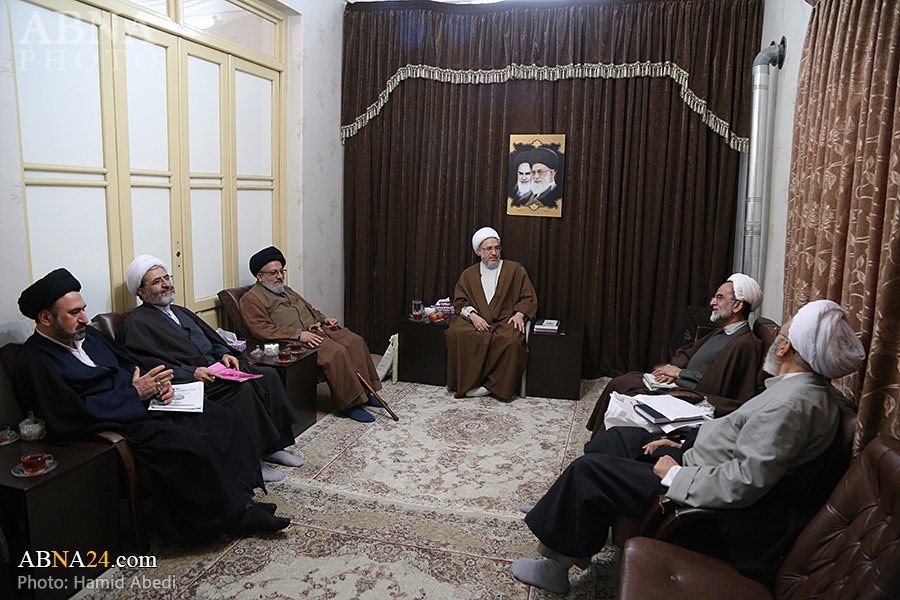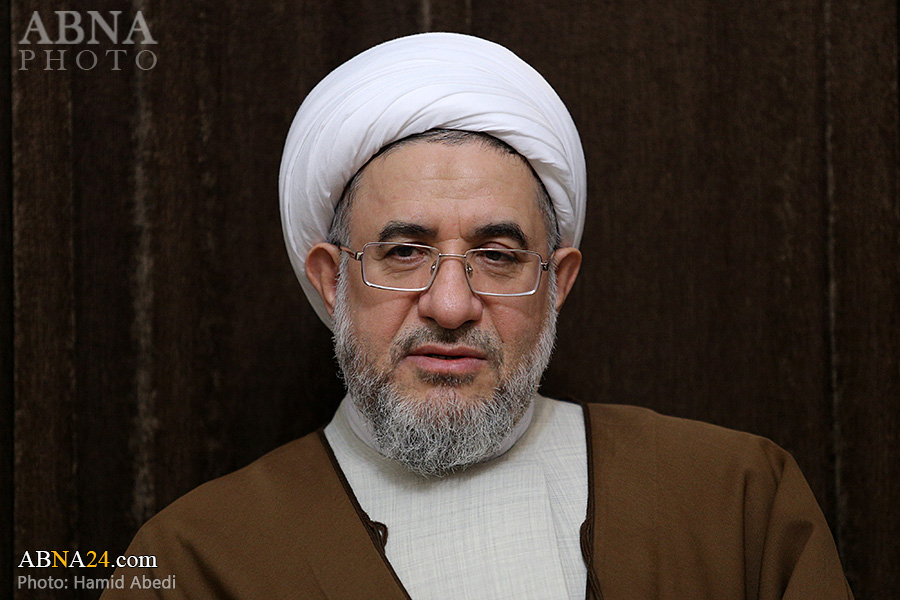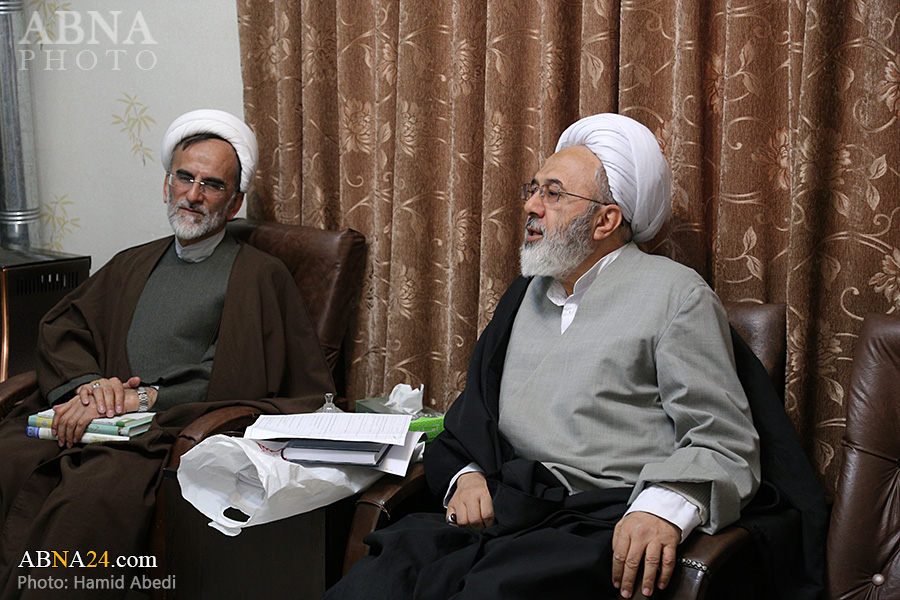Without Abu Talib’s support, Islam wouldn’t have developed in Mecca: Ayatollah Araki
The member of the Supreme Council of the AhlulBayt (a.s.) World Assembly stated, “Until the tenth year after the Be’that when Abu Talib (a.s.) was alive, the enmity of the Quraysh with the Holy Prophet (p.b.u.h) was not so much. But after his death, the enemies decided to kill the Prophet (p.b.u.h) and the story of Hijra (migration of the Holy Prophet from Mecca to Median) took place.
Members of the Academic Council of the Abu Talib (a.s.) Conference met with Ayatollah Mohsen Araki, a member of the Supreme Council of the AhlulBayt (a.s.) World Assembly, and the Secretary-General of the World Forum for Proximity of Islamic Schools of Thought.
In line with the meetings of the members of the Academic Council of the “International Conference of Hazrat Abu Talib (a.s.); Supporter of the Great Prophet (p.b.u.h)” with the Sources of Emulation and Islamic scholars, some members of the Scientific Council of the conference met Ayatollah Mohsen Araki a member of the Supreme Council of the AhlulBayt (a.s.) World Assembly, and the Secretary-General of the World Forum for Proximity of Islamic Schools of Thought, on Monday, March 4, 2019.
In this meeting, Hojat al-Islam Dr. Imani Moghadam, Deputy for the Cultural Affairs of the AhlulBayt (a.s.) World Assembly, Hojat al-Islam Sabahi Kashani, President of the Research and Publication Institute of Hazrat Abu Talib (a.s.) and member of the Academic Council of the Abu Talib (a.s.) Conference, Hojat al-Islam Sayed Monzar Hakim, the chairman of Al-Zoria Al-Nabawiya Research Institute and a member of the Academic Council of the Abu Talib Conference, Hojat al-Islam Sayed Mohammad Reza Ale-Ayub, Head of the Research Office of the AhlulBayt (a.s.) World Assembly, Hojat al-Islam Jafari Farahani, Secretary of the Academic Council of the Abu Talib Conference and Secretary of the Book Council of the AhlulBayt (a.s.) World Assembly, and Mr. Karimian Rad, the representative of the International Center of the Seminary were present.

In this meeting, Ayatollah Araki stated, “The introductory activity is very important and valuable for Hazrat Abu Talib (a.s.), as Sheikh Al-Abateh and father of Imam Ali (a.s.). Of course, it is important to show his role in promoting the call of the Holy Prophet (p.b.u.h) and Islam.”
“With the dominance of the enemies of the Prophet (p.b.u.h) in Mecca, the presence of Abu Talib (a.s.) in the scene and the custody of the Prophet (p.b.u.h) in childhood, adolescence and youth, until the Be’that, and after that, and the events of She’b (Valley) of Abi Talib (during the Quraysh boycott on Bani Hashem, Prophet Muhammad, and his followers), were remarkable and valuable. So, we might say that without his support, Islam could not have grown in Mecca. Until the tenth year after the Be’that when Abu Talib (a.s.) was alive, the enmity of the Quraysh with the Holy Prophet (p.b.u.h) was not so much. But after his death, the enemies decided to kill the Prophet (p.b.u.h) and the story of Hijra (migration of the Holy Prophet from Mecca to Median) took place,” he added.
“The fact that it is said that Hazrat Abu Talib (a.s.) did not believe in Islam and did not say the Shahada, is mainly due to Taqiya (hiding the real belief) and this issue should be explained. In fact, Taqiya is the shield and tool of resistance and struggle, and the verses of the Quran indicate it. On the other hand, the enmity of the Quraysh and their stubbornness are mentioned in the Quran. As a result, they waged wars to stifle Islam and prevent its promotion and spread. But by the grace and will of God, and with the efforts and resistance of the Muslims, they did not succeed. We also know what evils the Umayyad tribe did during the Umayyad dynasty. One of the topics they tried to instill in the people and Muslims was the issue of the unbelief of Abu Talib (a.s.). Unfortunately, the effect of these actions has remained in Tafir, hadith and historical sources until now,” stated the member of the Supreme-Council of the AhlulBayt (a.s.) World Assembly on the doubts about the faith of Hazrat Abu Talib (a.s.).

“One of the measures that must be taken is to study the historical and hadith sources, and the enmity of the Quraysh and the Umayyads against the Banu Hashim, and to explain it to the public. In Sunni sources, they made Jarir and Al-Farazdaq, which shows the enmity and conflict of the Umayyads against the Banu Hashim,” he added.
“The opportunity of this conference should be used for the change of the Seminary, and along with other topics, seminary scholars, professors and researchers should enlighten about Hazrat Abu Talib (a.s.). So, that the effects of these measures can be felt after the conference. Like the conferences of the late Sheikh Ansari and the late Sheikh Mofid which became historical,” said Ayatollah Araki, while proposing to the organizers of the conference that the poetry and literature should also be considered in the Abu Talib (a.s.) conference.
At the beginning of the meeting, Hojat al-Islam Abbas Jafari Farahani, Secretary of the Academic Council of the Abu Talib (a.s.) Conference, presented a brief report on the activities and actions taken so far.
He said, “After the approval of holding this conference in the Supreme Council of the AhlulBayt (a.s.) World Assembly, initial measures were taken, such as inviting representatives of cultural and propagation institutions and centers. The officials also introduced their representatives.”

“With the presence of honorable members, the meetings of the Academic Council were organized and the titles and axes of the call were approved, the poster and brochure of the call were published, and distributed in Persian, Arabic and English. Meetings were also held with the Sources of Emulation: Ayatollah Alavi Gorgani, Ayatollah Lotfollah Safi Golpaygani, Ayatollah Nouri Hamedani, Ayatollah Makarem Shirazi and Hojat al-Islam Shahrestani, the representative of Grand Ayatollah Sistani. These figures supported the holding of the conference. So far, a number of books (about 20 titles) have been introduced by Hojat al-Islam Sabahi Kashani - who first proposed holding this conference to the AhlulBayt (a.s.) World Assembly - and they are under review and evaluation. Also, a number of articles and abstracts (about 20 cases) have been submitted to the conference secretariat,” he added.
Hojat al-Islam Sabahi Kashani, a member of the Academic Council of the Abu Talib Conference, stated, “Several years ago, when I established the institute of Hazrat Abu Talib (a.s.), I began to identify various sources on the subject of Hazrat Abu Talib (a.s.). The main reason for my efforts in this regard was the lack of information of the clerics who preached during the Hajj event. With this summary of the oppression of Hazrat Abu Talib (a.s.), I started the work.”
“The efforts of Shiite scholars about Hazrat Abu Talib (a.s.), from past scholars to the late Allameh Amini, are admirable. Sunni writers have also written in this regard. At the institute, we have collected and reviewed Sunni books (about Abu Talib), some of which have been published,” he continued.

“To introduce the character of Hazrat Abu Talib (a.s.), little pamphlets have been prepared and published. By accepting the holding of the International Conference of Hazrat Abu Talib (a.s.) by the AhlulBayt (a.s.) World Assembly, and the support of the Grand Sources of Emulation, and Hojat al-Islam Akhtari, we hope to be able to do our best in this regard,”, said the chairman of Hazrat Abu Talib (a.s.) Research and Publishing Institute in the end.
Click here to see more pictures of the meeting of the members of the Academic Council of the International Conference of Hazrat Abu Talib (a.s.) with Ayatollah Araki.
It should be mentioned that by the initiation of the AhlulBayt (a.s.) World Assembly, and support and cooperation of the similar institutions, including, “Imam Hossein (a.s.) Holy Shrine”, “Hazrat Aboutaleb Research and Publishing Institute”, “The World Forum for Proximity of Islamic Schools of Thought”, “Islamic Sciences and Culture Academy of Islamic Propagation Office”, “Al-Mustafa International University”, “Hawza Language teaching center”, “International University of AhlulBayt (a.s.)”, “Mirath-e Nabowat Cultural Institute”, “Jamiat al-Zahra Seminary University”, “Zorria al-Nabawia Research Center”, “Qasem ibn al-Hassan (a.s.) Religious-Cultural Institute”, and “Abna al-Rasoul Cultural and Artistic Institute”; international conference “Hazrat Abu Talib (a.s.), Supporter of the Great Prophet (p.b.u.h)” will be held on Rajab 25, 26 and 27, 1442 (March 9, 10 and 11, 2021) on the anniversary of the death of Abu Talib (a.s.).
The deadline for submitting academic works and articles to this conference has been extended until February 18, 2021.
To receive the academic call of the conference, click here.
The other program which will be held on the sideline of the conference is the “General Festival of Poetry about Hazrat Abu Talib (a.s.)”.
To receive the academic call for the Poetry Festival, click here.
The member of the Supreme Council of the AhlulBayt (a.s.) World Assembly stated, “Until the tenth year after the Be’that when Abu Talib (a.s.) was alive, the enmity of the Quraysh with the Holy Prophet (p.b.u.h) was not so much. But after his death, the enemies decided to kill the Prophet (p.b.u.h) and the story of Hijra (migration of the Holy Prophet from Mecca to Median) took place.
Members of the Academic Council of the Abu Talib (a.s.) Conference met with Ayatollah Mohsen Araki, a member of the Supreme Council of the AhlulBayt (a.s.) World Assembly, and the Secretary-General of the World Forum for Proximity of Islamic Schools of Thought.
In line with the meetings of the members of the Academic Council of the “International Conference of Hazrat Abu Talib (a.s.); Supporter of the Great Prophet (p.b.u.h)” with the Sources of Emulation and Islamic scholars, some members of the Scientific Council of the conference met Ayatollah Mohsen Araki a member of the Supreme Council of the AhlulBayt (a.s.) World Assembly, and the Secretary-General of the World Forum for Proximity of Islamic Schools of Thought, on Monday, March 4, 2019.
In this meeting, Hojat al-Islam Dr. Imani Moghadam, Deputy for the Cultural Affairs of the AhlulBayt (a.s.) World Assembly, Hojat al-Islam Sabahi Kashani, President of the Research and Publication Institute of Hazrat Abu Talib (a.s.) and member of the Academic Council of the Abu Talib (a.s.) Conference, Hojat al-Islam Sayed Monzar Hakim, the chairman of Al-Zoria Al-Nabawiya Research Institute and a member of the Academic Council of the Abu Talib Conference, Hojat al-Islam Sayed Mohammad Reza Ale-Ayub, Head of the Research Office of the AhlulBayt (a.s.) World Assembly, Hojat al-Islam Jafari Farahani, Secretary of the Academic Council of the Abu Talib Conference and Secretary of the Book Council of the AhlulBayt (a.s.) World Assembly, and Mr. Karimian Rad, the representative of the International Center of the Seminary were present.

In this meeting, Ayatollah Araki stated, “The introductory activity is very important and valuable for Hazrat Abu Talib (a.s.), as Sheikh Al-Abateh and father of Imam Ali (a.s.). Of course, it is important to show his role in promoting the call of the Holy Prophet (p.b.u.h) and Islam.”
“With the dominance of the enemies of the Prophet (p.b.u.h) in Mecca, the presence of Abu Talib (a.s.) in the scene and the custody of the Prophet (p.b.u.h) in childhood, adolescence and youth, until the Be’that, and after that, and the events of She’b (Valley) of Abi Talib (during the Quraysh boycott on Bani Hashem, Prophet Muhammad, and his followers), were remarkable and valuable. So, we might say that without his support, Islam could not have grown in Mecca. Until the tenth year after the Be’that when Abu Talib (a.s.) was alive, the enmity of the Quraysh with the Holy Prophet (p.b.u.h) was not so much. But after his death, the enemies decided to kill the Prophet (p.b.u.h) and the story of Hijra (migration of the Holy Prophet from Mecca to Median) took place,” he added.
“The fact that it is said that Hazrat Abu Talib (a.s.) did not believe in Islam and did not say the Shahada, is mainly due to Taqiya (hiding the real belief) and this issue should be explained. In fact, Taqiya is the shield and tool of resistance and struggle, and the verses of the Quran indicate it. On the other hand, the enmity of the Quraysh and their stubbornness are mentioned in the Quran. As a result, they waged wars to stifle Islam and prevent its promotion and spread. But by the grace and will of God, and with the efforts and resistance of the Muslims, they did not succeed. We also know what evils the Umayyad tribe did during the Umayyad dynasty. One of the topics they tried to instill in the people and Muslims was the issue of the unbelief of Abu Talib (a.s.). Unfortunately, the effect of these actions has remained in Tafir, hadith and historical sources until now,” stated the member of the Supreme-Council of the AhlulBayt (a.s.) World Assembly on the doubts about the faith of Hazrat Abu Talib (a.s.).

“One of the measures that must be taken is to study the historical and hadith sources, and the enmity of the Quraysh and the Umayyads against the Banu Hashim, and to explain it to the public. In Sunni sources, they made Jarir and Al-Farazdaq, which shows the enmity and conflict of the Umayyads against the Banu Hashim,” he added.
“The opportunity of this conference should be used for the change of the Seminary, and along with other topics, seminary scholars, professors and researchers should enlighten about Hazrat Abu Talib (a.s.). So, that the effects of these measures can be felt after the conference. Like the conferences of the late Sheikh Ansari and the late Sheikh Mofid which became historical,” said Ayatollah Araki, while proposing to the organizers of the conference that the poetry and literature should also be considered in the Abu Talib (a.s.) conference.
At the beginning of the meeting, Hojat al-Islam Abbas Jafari Farahani, Secretary of the Academic Council of the Abu Talib (a.s.) Conference, presented a brief report on the activities and actions taken so far.
He said, “After the approval of holding this conference in the Supreme Council of the AhlulBayt (a.s.) World Assembly, initial measures were taken, such as inviting representatives of cultural and propagation institutions and centers. The officials also introduced their representatives.”

“With the presence of honorable members, the meetings of the Academic Council were organized and the titles and axes of the call were approved, the poster and brochure of the call were published, and distributed in Persian, Arabic and English. Meetings were also held with the Sources of Emulation: Ayatollah Alavi Gorgani, Ayatollah Lotfollah Safi Golpaygani, Ayatollah Nouri Hamedani, Ayatollah Makarem Shirazi and Hojat al-Islam Shahrestani, the representative of Grand Ayatollah Sistani. These figures supported the holding of the conference. So far, a number of books (about 20 titles) have been introduced by Hojat al-Islam Sabahi Kashani - who first proposed holding this conference to the AhlulBayt (a.s.) World Assembly - and they are under review and evaluation. Also, a number of articles and abstracts (about 20 cases) have been submitted to the conference secretariat,” he added.
Hojat al-Islam Sabahi Kashani, a member of the Academic Council of the Abu Talib Conference, stated, “Several years ago, when I established the institute of Hazrat Abu Talib (a.s.), I began to identify various sources on the subject of Hazrat Abu Talib (a.s.). The main reason for my efforts in this regard was the lack of information of the clerics who preached during the Hajj event. With this summary of the oppression of Hazrat Abu Talib (a.s.), I started the work.”
“The efforts of Shiite scholars about Hazrat Abu Talib (a.s.), from past scholars to the late Allameh Amini, are admirable. Sunni writers have also written in this regard. At the institute, we have collected and reviewed Sunni books (about Abu Talib), some of which have been published,” he continued.

“To introduce the character of Hazrat Abu Talib (a.s.), little pamphlets have been prepared and published. By accepting the holding of the International Conference of Hazrat Abu Talib (a.s.) by the AhlulBayt (a.s.) World Assembly, and the support of the Grand Sources of Emulation, and Hojat al-Islam Akhtari, we hope to be able to do our best in this regard,”, said the chairman of Hazrat Abu Talib (a.s.) Research and Publishing Institute in the end.
Click here to see more pictures of the meeting of the members of the Academic Council of the International Conference of Hazrat Abu Talib (a.s.) with Ayatollah Araki.
It should be mentioned that by the initiation of the AhlulBayt (a.s.) World Assembly, and support and cooperation of the similar institutions, including, “Imam Hossein (a.s.) Holy Shrine”, “Hazrat Aboutaleb Research and Publishing Institute”, “The World Forum for Proximity of Islamic Schools of Thought”, “Islamic Sciences and Culture Academy of Islamic Propagation Office”, “Al-Mustafa International University”, “Hawza Language teaching center”, “International University of AhlulBayt (a.s.)”, “Mirath-e Nabowat Cultural Institute”, “Jamiat al-Zahra Seminary University”, “Zorria al-Nabawia Research Center”, “Qasem ibn al-Hassan (a.s.) Religious-Cultural Institute”, and “Abna al-Rasoul Cultural and Artistic Institute”; international conference “Hazrat Abu Talib (a.s.), Supporter of the Great Prophet (p.b.u.h)” will be held on Rajab 25, 26 and 27, 1442 (March 9, 10 and 11, 2021) on the anniversary of the death of Abu Talib (a.s.).
The deadline for submitting academic works and articles to this conference has been extended until February 18, 2021.
To receive the academic call of the conference, click here.
The other program which will be held on the sideline of the conference is the “General Festival of Poetry about Hazrat Abu Talib (a.s.)”.
To receive the academic call for the Poetry Festival, click here.





